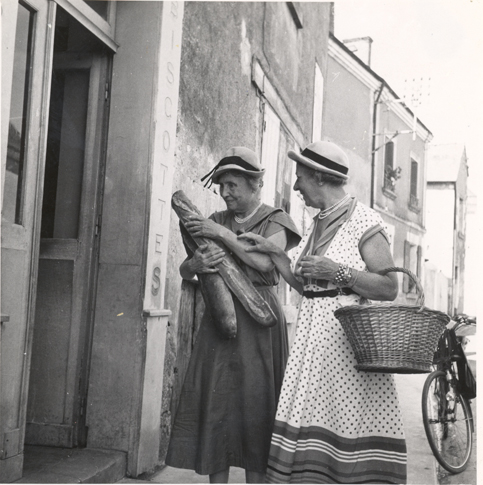
This week’s blog for Inside the Helen Keller Digitization Project is a wonderful piece by David Serlin, associate professor of communication and science studies at the University of California, San Diego. Enjoy!
One of my favorite objects in the Helen Keller Archives is this photograph of Keller and her secretary and companion Polly Thomson, taken in Paris in 1952. I discovered it, about five years ago, among a treasure trove of tiny snapshots of Keller and Thomson on holiday, probably taken by filmmaker Nancy Hamilton while she was collecting background material for her 1956 Oscar-winning Best Documentary Helen Keller in Her Story. As with most holiday snapshots, these photographs were never intended for publication or even perhaps for posterity. Yet the image, its undeniable charm notwithstanding, also reveals the extent of Keller's engagement with the ordinary world that often gets overlooked in more formal historical accounts of her extraordinary life.
In the photograph, Keller and Thomson are standing outside a bakery, while Keller poses with an armful of fresh baguettes. Keller has a particular expression on her face — a kind of inquisitive, contemplative engagement with the texture of the bread — while clutching the loaves close to her chest. Meanwhile, Thomson has her right hand on Keller's left arm, possibly to help guide Keller toward the nearby doorway. Keller is wearing a simple cotton dress and hat and her trademark pearl necklace. Similarly, Thomson is dressed to the nines, in a hat, pearls, and polka dot sundress with stripes along the bottom hem, with a wicker shopping basket crooked in her left arm.
The photograph documents the daily joy that Keller experienced as she made her way through the world, as mediated through her own senses as well as through the articulate hand of a companion like Thomson. But it also captures a rekindling of memories, since the pair had made a brief visit to Paris in January 1937 while en route to Japan. In her diary entries from 1937, Keller waxes rhapsodically about smelling wine and tobacco and perfume and feeling the fabrics of elegant dresses in boutiques along the Champs-Élysées. Similarly, the 1952 photo is part of an ensemble of images of Keller doing things that tourists in Paris have been seemingly doing forever: sitting in a café drinking coffee or wine, browsing in the book stalls along the Seine, visiting sites like the Eiffel Tower or Sacré-Cœur. In the window of the bakery, onto which one can see the word biscottes carved into the door frame, one can also see the slight reflection of the ubiquitous green-blue signs that not only indicate the street name but also the arrondissement, or neighborhood, in which the two are having their encounter.
Yet the Paris revealed in this photograph was a completely different Paris than the one Keller and Thomson had visited in 1937, when the City of Light was also a center of radical political unrest and cultural experimentation just before the outbreak of global war in 1939 and the Nazi occupation of France in 1940. In this sense, images like this one provide evidence not only of Keller’s personal journey but also the kind of objects that would have been associated with cosmopolitan Americans traveling abroad in the 1950s. The image of Keller buying baguettes in a typical Parisian mis-en-scene was snapped during the height of a particular kind of romance with Parisian street culture made famous by photographers like Robert Doisneau that circulated in newspapers and magazines after the war. A parked bicycle leaning jauntily on the sidewalk, a flower box visible from a second-story window, the inviting space of a market basket ready to be filled to the brim: all exist at the potent intersection of tourism, nostalgia, memory, and, in certain ways, a kind of suspension of reality in the fifteen years since Keller and Thomson made their last visit.
Be sure to track this blog by e-mail to be notified whenever new posts are added. You can also sign up for a free My AFB account to customize your alerts even further.